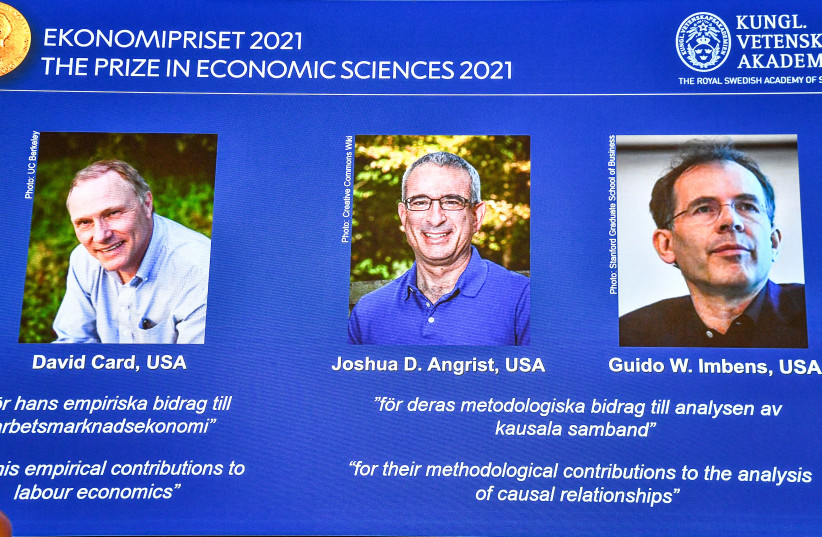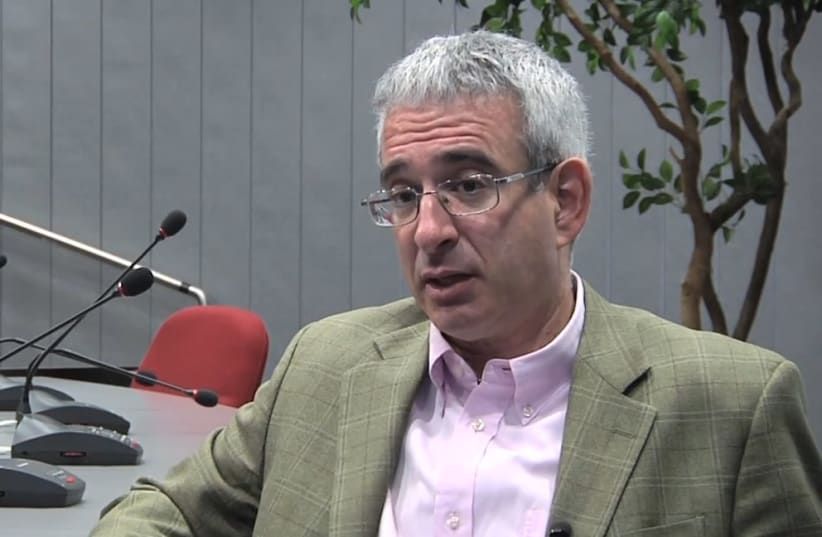Israeli-American economist Joshua Angrist was awarded the 2021 Nobel economics prize together with David Card and Guido Imbens on Monday for pioneering the use of “natural experiments” to understand the causal effects of economic policy and other events.
Natural experiments use real-life situations to work out impacts on the world, an approach that has spread to other fields and revolutionized empirical research.
The prize, formally known as the Sveriges Riksbank Prize in Economic Sciences in Memory of Alfred Nobel, is the last of this year’s crop of Nobels. The winners share 10 million Swedish crowns ($1.14m.).
Canadian-born Card, 65, a professor of economics at the University of Berkeley, California, received half the prize “for his empirical contributions to labor economics,” the academy said.
Angrist and Imbens, the latter of whom is 58 and a professor of economics at the Stanford Graduate School of Business, shared the other half “for their methodological contributions to the analysis of causal relationships.”
Joshua D. Angrist and Guido W. Imbens have been awarded the 2021 prize in economic sciences “for their methodological contributions to the analysis of causal relationships.”#NobelPrize
— The Nobel Prize (@NobelPrize) October 11, 2021
“I was just absolutely stunned to get a telephone call; then I was just absolutely thrilled to hear the news,” Imbens said on a call with reporters in Stockholm, adding that he was thrilled to share the prize with two of his good friends. Angrist was the best man at his wedding.

The three laureates had “provided us with new insights about the labor market and shown what conclusions about cause and effect can be drawn from natural experiments,” Nobel Institute said in a statement, NBC reported.
The official Israel Twitter account, run by the Foreign Ministry, congratulated Angrist, 61, on his achievement.
Mazal Tov to Israeli-American Joshua D.Angrist on winning the Nobel Prize in Economics! https://t.co/8QveN2pEmS
— Israel ישראל (@Israel) October 11, 2021
Angrist was born in Columbus, Ohio, and later made aliyah to Israel. He received his master’s degree and PhD in economics from Princeton University in 1987 and 1989, respectively. He worked at both Harvard University and the Hebrew University of Jerusalem before joining the Massachusetts Institute of Technology (MIT), where he remains.
Angrist made aliyah in 1982 and lived here until 1985. He later came back to teach in Hebrew University’s Economics Department in 1995-1996.
In an interview with The Jerusalem Post in 2006, Angrist explained why he left, saying he “was tired of the situation” in which professors in fields such as computer science and economics were paid the same as professors of literature.
“Talented people who might like to work in Israel have to pay a high price for that financially,” he said. “It’s hard to retain people with that kind of system.”
“Congrats to MIT’s Prof. Joshua Angrist on winning a share of the Sveriges Riksbank Prize in Economic Sciences in Memory of Alfred Nobel for ‘methodological contributions to the analysis of causal relationships,’” MIT tweeted.
Congrats to @MITEcon Prof. Joshua Angrist (@Metrics52) on winning a share of the Sveriges Riksbank Prize in Economic Sciences in Memory of Alfred Nobel for “methodological contributions to the analysis of causal relationships”! pic.twitter.com/A38LZn5WwQ
— Massachusetts Institute of Technology (MIT) (@MIT) October 11, 2021
Throughout his career, Angrist has carried out numerous studies on labor economics and the economics of education, the latter of which saw him conduct studies on schools in Israel, the US, Colombia and Canada. He has also written multiple papers on the subject of the labor conditions in the Israeli-controlled West Bank and Gaza Strip.
In 1994, Angrist served on the Finance Ministry’s Working Group on Israeli-Palestinian Labor Market Relations, JTA reported.
But what may be his most significant achievement was his contribution to econometrics.
“For the most part, in economics, we don’t have laboratory conditions for our studies,” noted economist and former MK Manuel Trajtenberg said. “We have to tease out cause and effect from the data because we don’t have laboratory conditions. But in the late 1980s, Angrist and others – though he was the main contributor – developed a methodology to do precisely that. It’s a huge contribution.”
Trajtenberg praised Angrist for his achievement.
“He certainly deserves it,” he said. “It’s a great honor for Israel that he won the Nobel Prize.”
Angrist’s wife, Mira, in an interview with N12 following the announcement, said she and her husband are Israelis “with every bone in their bodies.”
“We met in the Hebrew University of Jerusalem after he made aliyah... our lives are run between Israel and Boston... We’re very excited right now,” she said.
Angrist’s son, Noam, has also worked in the field of economics and education. He is the co-founder of Botswana-based NGO Young 1ove and is a fellow at the University of Oxford. Additionally, he has worked with several units of the World Bank.
“So proud of my dad who just won” the Nobel Prize, Noam tweeted. “Can’t wait for a good dinner later.”
SO PROUD OF MY DAD WHO JUST WON @NobelPrize! @metrics52! Can't wait for a good dinner later https://t.co/JEOg4VerPE
— Noam Angrist (@angrist_noam) October 11, 2021
The Hebrew University issued a statement on Monday afternoon, congratulating Angrist.
“HU heartily congratulates Prof. Joshua Angrist and Guido Imbens, along with David Carr, on being awarded the 2021 Sveriges Riksbank Prize in Economic Sciences in Memory of Alfred Nobel. The award was given for their methodological contributions to the analysis of causal relationships, and empirical contributions to labor economics, respectively. Angrist spent a good number of years at HU, serving as a senior lecturer in economics from 1991-1995, and as an associate professor at HU’s Economics Department from 1995-1996, before returning as a Lady Davis Fellow in 2004-2005.”
Prof. Asher Cohen, president of Hebrew University, said: “Congratulations to Prof. Angrist on being awarded the most prestigious honor in the field of economics – the Nobel Prize. Angrist spent several years teaching at Hebrew University’s Department of Economics. His prize honors us and is a great privilege for the many HU students lucky enough to have learned with him.”
Angrist’s colleague and good friend Prof. Victor Lavy, of Hebrew University’s Bogen Family Department of Economics, said: “Joshua Angrist is a loyal friend of the State of Israel and of Hebrew University. For decades now, he has been my research partner and a close personal friend. I’m so happy for him and proud of his amazing achievement.”
Angrist has maintained an active career, continuing to write papers and teach seminars, as well as releasing a Q&A video series through Marginal Revolution University regarding common questions and misconceptions about economics, which can be seen on YouTube.
This was not the first time Angrist was nominated for a Nobel Prize, having been among the front-runners in 2019, alongside fellow Israeli Elhanan Helpman, the Associated Press reported at the time.
Angrist is also the 13th Israeli to have won a Nobel Prize and the third to have won it in economics. The other two are Daniel Kahneman, who won in 2002 for integrating insights from psychology into economics, and Robert Aumann, who won in 2005 for his work on game theory.
Reuters contributed to this report.
